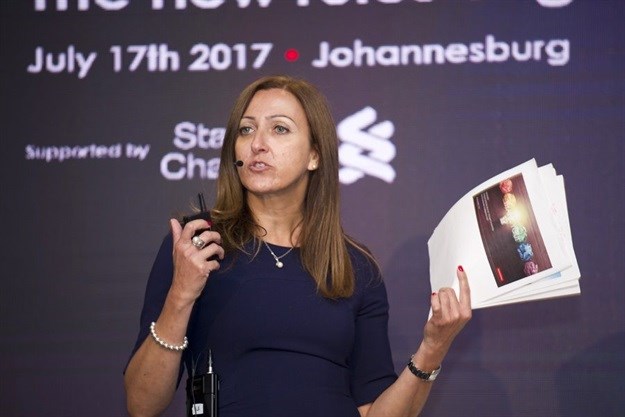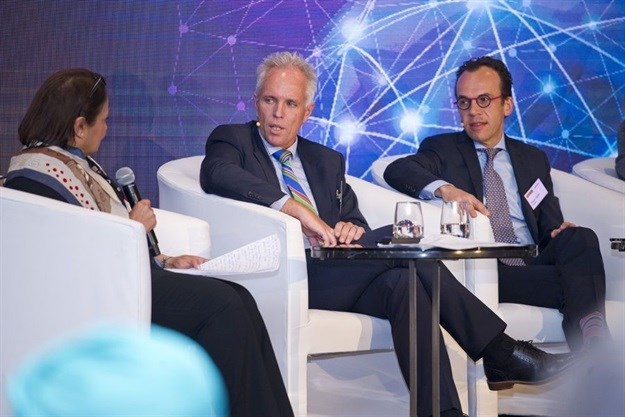
Top stories





Energy & MiningGlencore's Astron Energy gears up with new tanker amidst Sars dispute
Wendell Roelf 14 hours

More news

















Logistics & Transport
Uganda plans new rail link to Tanzania for mineral export boost











In her opening address Irene Mia, global editor, thought leadership at The Economist Intelligence Unit (EIU), said, “While there is geopolitical uncertainty, I think we all agree that globalisation and the work that has been done over 35 years cannot simply be reversed. Innovation in technology shows how unstoppable globalisation is.”
Pat Thaker, editorial and regional director, Middle East and Africa at the EIU, unpacked the key global themes for the 2018. “The world economy is looking its healthiest for some time. Global trade is still upbeat, despite the rise in populism. Emerging markets are leading the way and we expect this year to end fairly strongly but defined by bad politics and uncertain economics. The political outlook is deteriorating. We are seeing the highest level of political risk in years and 2018 will be another year of anxiety and market jitters.
“This geopolitical environment, meant it was important for multinationals to review and re-assess their strategies, and address major risk factors. While Asia will continue to see solid economic growth, driven by China and India, Africa - in particular sub-Saharan Africa - will experience slower growth in 2018. Major economies in sub-Saharan Africa, such as South Africa and Nigeria, will see very slow growth of below 3% in 2018.”
Natarajan Venkatakrishnan, chief executive of Giddy.io and director, advanced technologies at GE Appliances, shed some light on the challenges of a multinational innovating in the same way a startup would.
Three years ago, Venkatakrishnan set up Giddy.io – a startup owned by GE – with the sole purpose of innovating new products and bringing them to market in a new and agile way. Giddy.io operates in the exact way a startup would but can rely on the parent company to support it when it comes to scalability and regulatory issues.
“What I learnt is that you set up the big business like a navy and when you want to do something new we set up like a pirate ship: quick, easy to move and turnaround. Many startups fail because they do not know how to scale up. We went the other way. We knew how to scale so we started a startup.”
As part of the event, The EIU launched new content that threw the spotlight on the importance of responsible supply chains.
With its world premiere at the event, ‘Sourcing Transparency: Who should clean-up supply chains?’ is a mini-documentary that looks at how policymakers and companies are paving the way in creating more transparent and responsible supply chains. In addition, no more excuses: responsible supply chains in a globalised world is a new report that finds that progress in raising ethical standards in global supply chains has stalled in many places, and in supply chains: a collective responsibility. The EIU interviewed globally-renowned experts including Professor Richard Locke, provost at Brown University, to understand how supply chain complexity has created a need for the private sector to regulate itself better.

A key debate on the day centred on the inclusion of women in senior management positions. While patriarchy was highlighted as a major challenge globally, Africa is making strides when it comes to empowering women in business.
Ayodele Odusola, chief economist and head of strategy and analysis at the Regional Bureau for Africa, United Nations Development Programme New York, said, “Gender equality in Africa is improving but we are not yet there. The inclusion of women is generating many positive effects. What is important for us to realise is that it is not only an economic imperative but also a development imperative.
“South Africa has set a good example when it came to empowering women, growing the number of women in the boardroom from 7% to 17% in the private sector and from 7% to 34% in the public sector from 2004 to 2013.
However, Nkiru Balonwu, co-founder, African Women on Boards, said there was still much that could be done to empower women in Africa.“We have to change the minds of men who are gatekeepers. We need to convince men that as women we can maximise opportunities and shareholder value.”
Standard Chartered supported the event.